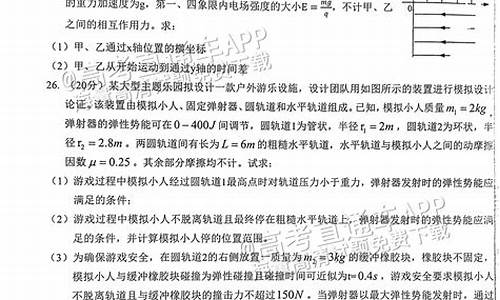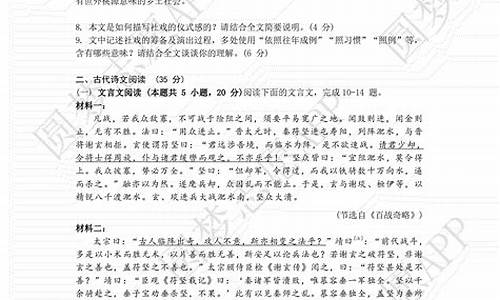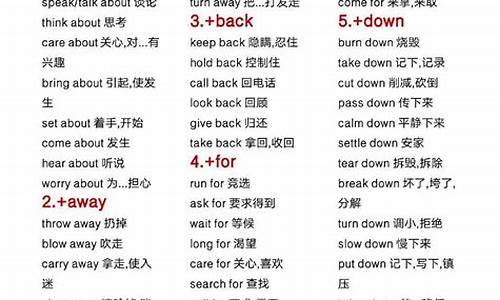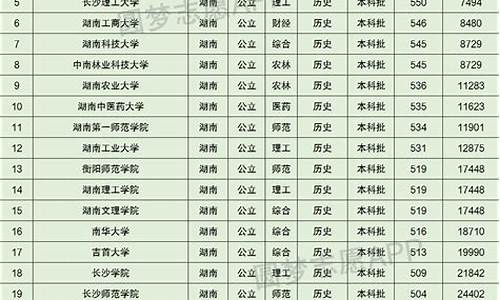您现在的位置是: 首页 > 教育改革 教育改革
2017英语高考答案江西-2017年英语高考试卷答案
tamoadmin 2024-09-21 人已围观
简介1.2017年成人高考《英语》语法误用:虚拟语气2.2017高考英语2卷改错的问题?3.2017年高考英语备考:关系代词副词的区别2017年成人高考《英语》语法误用:虚拟语气1、中文:我要是你,我不会那么做。 (误)I shouldn"t do that if I was you. (正)I shouldn"t do that if I were you.(表示与现在事实相反的虚拟语气不能用wa
1.2017年成人高考《英语》语法误用:虚拟语气
2.2017高考英语2卷改错的问题?
3.2017年高考英语备考:关系代词副词的区别
2017年成人高考《英语》语法误用:虚拟语气

1、中文:我要是你,我不会那么做。
(误)I shouldn"t do that if I was you.
(正)I shouldn"t do that if I were you.(表示与现在事实相反的虚拟语气不能用was,只能用were.)
2、中文:要是我父亲现在在这里,他会告诉我该做什么。
(误)If my father were here now,he will tell me what to do.
(正)If my father were here now,he would tell me what to do.(表示与现在事实相反的虚拟语气中,主句的助动词只能用would,might等过去时。)[环球网校成人高考频道整理虚拟语气误用]
3、中文:要是我知道她的电话号码,我就会给她打电话了。
(误)If I knew her telephone number,I would have called her.
(正)If I had known her telephone number,I would have called her.(表示与过去事实相反的虚拟语气中,条件从句的动词要用过去完成时。)
4、中文:要是昨天没下雨她也许会来。
(误)If it had not rained yesterday,he might come.
(正)If it had not rained yesterday,he might have come.(表示与过去事实相反的虚拟语气中,主句的动词要用助动词的过去时might,could等+HAVE+过去分词。)
5、中文:我不认为我会失败,但要是我失败了,我会再努力。
(误)I don"t think that I shall fail. But if I failed,I would try again.
(正)I don"t think that I shall fail. But if I should fail,I would try again.(表示与将来事实相反的虚拟语气中,条件从句的动词用should加原形动词。)
2017高考英语2卷改错的问题?
第一个的话我觉得and也行,and是和的意思,可以表示对等,我觉得有时候也是引出补充说明句子,so吧也可以,主要是前后因果关系不是很强烈,住得远并不一定是要花1.5个小时到学校,住得远的果应该是上班路上时间长逻辑才算通顺,这是可改可不改的。
第二个,我认同你的说法,逗号后面是非限制性定语从句,要用which,不过前面interesting错的也很明显,感觉题出错了。
2017年高考英语备考:关系代词副词的区别
一、 关系代词和关系副词的区别
1、关系代词(that, who, whom, whose, which)所代替的先行词是人或物的名词或代词,并在句中充当主语、宾语、定语等成分。
例1. Is he the man who/that wants to see you?(who / that在从句中作主语,指人)
例2. He is the man whom/ that I saw yesterday.(whom / that在从句中作宾语,指人)
例3. They rushed over to help the man whose car had broken down.(whose在句中作定语,指人)
例4. Please pass me the book whose (of which) cover is green.(whose在句中作定语,指物。若指物,它还可以同of which互换)
例5. The package (which / that) you are carrying is about to come unwrapped. 你拿的包快散了。(which / that在句中作carry的宾语,指物)
2、关系副词(when, where, why, that)可代替的先行词是时间、地点或理由的名词,在从句中作状语。关系副词when, where, why的含义相当于"介词+ which"结构,因此常常和"介词+ which"结构交替使用。
例6. Beijing is the place where (in which) I was born.
例7. Is this the reason why (for which) he refused our offer?
例8. His father died the year (that / when / in which) he was born.
例9. He can’t find the place (that / where / in which) he lived forty years ago.
二、 判断用关系代词和关系副词
方法1: 用关系代词,还是关系副词完全取决于从句中的谓语动词。及物动词后面无宾语,就必须要求用关系代词;而不及物动词则要求用关系副词。请改错:
1. This is the mountain village where I visited last year.
2. I will never forget the days when I spent in the countryside.
习惯上总把表地点或时间的名词与关系副词 where, when联系在一起。此两题错在关系词的误用上。句1和句2的where, when都应改为which.。
方法2: 准确判断先行词在定语从句中的成分(主、谓、宾、定、状),根据第一点(区别),也能正确选择出关系代词/关系副词。
例10.This museum is ___ you visited a few days age?
A. where B. that C. on which D. the one
例11. This is the museum ____ the exhibition was held.
A. where B. that C. on which D. the one (答案:例1 D,例2 A)
在例10中,所缺部分为宾语,而where, that, on which都不能起到宾语的作用,只有the one既做了主句的表语,又可做从句的宾语,可以省略关系代词,所以应选D。
而例11中, 主、谓、宾俱全,从句部分为句子的状语表地点,既可用副词where,又因 in the museum词组,可用介词in + which 引导地点状语。而此题中,介词on 用的不对,所以选A。
关系词的选择依据在从句中所做的成分,先行词在从句中做主、定、宾语时,选择关系代词 (who, whom, that, which, whose); 先行词在从句中做状语时,应选择关系副词 ( where 地点状语,when 时间状语,why 原因状语)。
方法3:当先行词是all, everything, anything, nothing,the one, much, few, any, little等,或先行词是形容词级时,或在there be 句型中,或当先行行词既有人又有物时,关系代词用that, 而不用which。
例12. Finally, the thief handed everything that he had stolen to the police.
例13. The soldiers and their guns that we sent to the front were lost.
方法4:在引导非限定性定语从句时,和在介词后不能用that,应用which。
例14.(错) The tree, that (改为which)is four hundred years old, is very famous here.
例15.We depend on the land from which we get our food.









